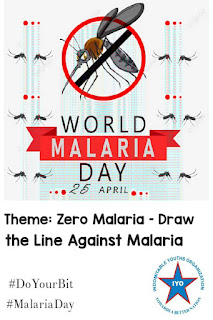Malaria Day 2021: WHY ERADICATION OF MALARIA IN NIGERIA STILL A MIRAGE
This year 2021, the world is aiming at celebrating countries that are reaching or approaching malaria eradication. Looking at the malaria response, one would be tempted to ask where Nigeria is in all these. Are we part of those reaching or approaching the point of eradication? The factual response is No!
There have concerted efforts on awareness creation which have not transformed to behavioural change based on what we see in our environment.
Although preventable and curable, Malaria is a life-threatening disease caused by parasites that are transmitted to people through infected mosquito bites.
Before COVID-19 surfaced, globally about 3.3 billion people in 106 countries are at risk of malaria. In 2012, malaria caused an estimated 627,000 deaths, mostly among African children. The World Health Organization estimates there were 229 million cases worldwide in 2019 and 409,000 deaths.
With most attention shifted to COVID-19 in the past couple of months, the attention given to malaria have dropped and in the usual trend would have claimed lives of some under five children and affected pregnancies. The illness starts with symptoms such as fever, headaches and chills and, without treatment, can progress quickly to severe illness and often death. However, other ailments can also present with similar symptoms.
Significant efforts are in place to produce a vaccine to cater for malaria, however, the most recent vaccine could actually produce 77% of result (the best so far) compared to previous ones that were a little above 50%. Getting the vaccine for malaria is complicated by the complexity of the genetic makeup of the plasmodium coupled with the numerous strains that are available. Even the most recent vaccines is still undergoing trial and yet to be available for human use.
The options that are available for approaching the eradication of malaria is ability to break the bridge between man and mosquitoes. This is with the understanding that the malaria parasite requires human and mosquitoes for the cycle to be completed. Once there is a barrier between mosquitoes and human, it would help in eradicating malaria from our system.
Breaking this bridge has been a problem in Nigeria over many years; eradicating malaria parasite from our system remains a mirage because our environment give room for mosquitoes and man to continually have contact. Even areas that are not slum gives a lot of breeding sites from mosquitoes. There are a lot of drains and other places in our environment with stagnant water (including our swimming pool, flower verse, waste bin etc) that serves as proper breeding sites for mosquitoes.
The waste management pattern that we operate right from the point of storage in our homes to the dumpsite where most available pattern remains open dumping. There are supposed to be government regulatory policies on this but effective implementation like many other policies have been a problem.
If Nigeria must be counted as one of those countries reaching or approaching malaria eradication, there has to conscious effort from the Government, Private sectors, Non State Actors and the citizens to play their role in a synergetic manner to address this issue.
Adequate sensitization and awareness to broaden people’s understanding of how to destroy breeding sites for mosquitoes, eliminate contact between mosquitoes and human is sure path to reaching or approaching malaria eradication.
If conscious efforts are not made on this path, eradication of malaria in Nigeria would remain a mirage.
Purchase and misuse of anti-malaria drugs over the counter should be discouraged in its entirety as it has contributed to development of resistant strains of the malaria parasite.
Considering COVID-19 and malaria, lets take into cognisance that malaria has been for decades while COVID-19 is just coming and COVID-19 has been declared a pandemic.
Nigerians should note that for the fact that attention shifted to COVID-19 did not eradicate malaria. Malaria remained one of the differential diagnosis of COVID-19 considering its endemicity in Nigeria.
At some point many persons opinied that COVID-19 was treated with malaria drugs, the fact remains that they are both separate ailment that can have similar signs and symptoms as well as coexist in the same person.
Nigerians should intensify effort to carry out activities that would promote eradication of Malaria with serious emphasis on environmental sanitation and hygiene to get rid of breeding sites for mosquitoes as well as observing the outlined COVID-19 protocols.
Dr. Bright Oniovokukor
sirniovo@gmail.com
08052735427
#Zeromalaria
#letseradicatemalaria
#rollbackmalaria
#wecanstopmalaria
#clearlineHMO
#Indomitableyouthsorganization
#cishan
#letsdoitfoundation
https://radioesanreporters.com/why-eradication-of-malaria-in-nigeria-still-a-mirage/
https://twitter.com/sirniovo/status/1386247488248688644?s=1002




Comments
Post a Comment